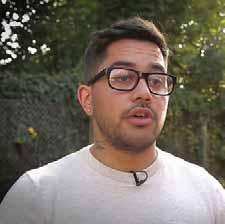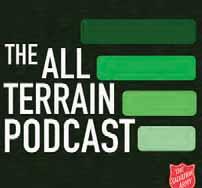
6 minute read
All Terrain questions 16 and

Gavin McKenna Miriam Swanson
‘I served in that place for 18 months. I cleaned toilets, cleaned floors, cooked food, washed people’s clothes and made their beds. I did things that I thought I was above, but I served faithfully. And what serving did was teach me a lot about myself and the heart of God.’
SEEING THE BROADER PICTURE
Having served in Bangladesh, Kenya and Zambia, Captain Richard Bradbury and his family have faced a lot of change, moved through much suffering – their own and that of others – and received much joy.
When asked ‘How do you mature in service?’ in episode 20 of the podcast, he responds: ‘Being overseas has made me realise it’s not really about what I can accomplish, but about how I live my life. Now, when I arrive at a place, I can see how God is already at work there. And, even in the worst of situations, I’m able to see the face of Jesus in the people that we’re working alongside and working with. Having a huge dose of humility has helped me to mature in service.’
This humility in looking out for how God is already at work has allowed Richard to learn from people of other faiths.
‘Many of our friends in Bangladesh were Muslims,’ he recalls, ‘and so we’ve explored our faith in relationship with people who think differently, who experience God in a different way. For me, that’s been such a rich experience. And those people of other faiths have helped me to mature.’
In episode 23 Intercultural Mission Enabler Major Jonny Smith espouses a similar open-mindedness to learn from those we serve.
‘Intercultural mission means a willingness to enter another person’s culture and space as much as you want them to enter your own,’ he says. ‘It’s a willingness to be mutually inconvenienced. When you do that and it works, at its best you start to create a bigger story than each of you started with.’
GETTING OUT OF YOUR DEPTH
Miriam Swanson works with university students. In episode 13 she explains that the best way for students to mature as disciples of Jesus is to get stuck in and serve – even if they’re not sure what they believe.
‘Serving is the way of discipleship. We’ve got to allow people to serve even when they’re questioning. If you want students to understand that they are the Church – they don’t [just] go to Church – then you can’t just have them as seat fillers on a Sunday and then not see them for a week and think that you’ve done your bit.’
This poses a challenge to any of us who lead within The Salvation Army. We must remember that, even after three years of journeying with Jesus and hearing him open up the Scriptures daily, his disciples were still working out what they believed. Soldiership should not be a barrier to people serving. For example, the Army has allowed open music sections for years, enabling attenders to get involved regardless of their professed position on faith or Salvation Army doctrines. But neither should opportunities for service be limited only to these traditional routes.
So, here’s a challenge: let’s be inclusive. If someone says ‘I don’t know for sure what I believe right now’, let’s be prompted to include them more intentionally, let them in, give them New episodes of The All Terrain Podcast are released on the last Friday of the month on Apple Podcasts, Podbean and Spotify. Episode 25 is out now and features Dr Naar M’fundisi-Holloway, action researcher in THQ’s Research and Development Unit.

Sketch notes and group questions that support each episode can be downloaded from the podcast’s webpage at salvationarmy.org.uk/ youth-and-children.
responsibility, ask for their help and let them participate and become fully immersed in the community of believers. Let’s not look at someone’s doubt or lack of expertise, but their potential to serve and their opportunity to grow in faith.
AN ONGOING JOURNEY
How do we mature in service? However we answer that question, we must bear in mind that we’ll never fully arrive. Matthew 23:8 reminds those with spiritual responsibility for others that ‘you have one teacher, and you are all students’ (New Revised Standard Version). In addition, we may find ourselves journeying the four paths of change, suffering, joy and service many times over the course of our lives.
So, let’s keep growing.
Lord, give us the humility, openmindedness, passion and courage to grow as we journey with you. Amen?
MATT WORSHIPS AT SUTTON AND WRITES THE ALL TERRAIN PODCAST SMALL GROUP QUESTIONS
Apest: Apostles

Captain Callum McKenna highlights Captain Callum McKenna highlights what it means to be ‘sent’ with God’s message what it means to be ‘sent’ with God’s message
JOHN 20:21 MATTHEW 28:19 AND 20
THERE’S a whole genre of historical fiction that I’ve recently become fascinated with called ‘alternative history’. It started a little while back when I got hooked on the BBC One drama SS-GB. The premise of the story imagines what might have happened if, during the Second World War, the UK had come under Nazi occupation. Each episode explores how history could then have taken a different turn.
QUESTION
When you think back over your life, what key decisions have shaped the course of your future?
What would have happened if the disciples made different choices in the days following Christ’s resurrection and ascension? We read, in Matthew 28:19, Jesus commanding them to: ‘Go and make disciples of all nations.’
Luke’s commissioning story in Acts 1 records Jesus, similarly, exhorting the disciples to be ‘witnesses in Jerusalem, and in all Judea and Samaria, and to the ends of the Earth’ (v8). It’s a big ask from Jesus. He’s sending his disciples to the edge of the known world, beyond their comfort zones, to places they’d never dreamt of going, where people speak different languages and have vastly different cultures. He’s entrusting them with the task of bearing witness to his resurrection and making disciples of people who view the world very differently.
How would history have turned out if the disciples had made different choices in the Church’s early days? What would have happened if they hadn’t viewed Jesus’ command as being literal? What would today’s Church look like if, instead of moving out from Jerusalem to the ends of the Earth, the disciples insisted on staying in the comfort and familiarity of Jerusalem?
Of course, the first disciples were willing to push out from Jerusalem. In fact, this arguably gives them the title ‘apostles’, which comes from the Greek apostolos, meaning ‘the sent one’.
Apostles are those who are sent forth with God’s message of salvation for the whole world. We’d be naive, however, to think that this was just about geography and taking the gospel to other locations. So much of our own culture is alien to the gospel and apostles are also required to bear witness to the transforming resurrection of Jesus in these places.
Through the week with Salvationist
– a devotional thought for each day
by Major Jane Kimberley
SUNDAY
Those first disciples of the Lord/ Received the promise of his word/ And in their lives such power did dwell/ To speed the message they should tell/ To all mankind, that Jesus lives,/ And grace to each believer gives;/ May that same grace inspire today/ To live for Christ, the life and way.
(SASB 680)
MONDAY
Again Jesus said, ‘Peace be with you! As the Father has sent me, I am sending you.’ (John 20:21)
Prayer
Lord Jesus, as you sent out your first disciples to proclaim your gospel, you promised you would always be with them. Help me to realise that, when sharing your good news, I am never alone. TUESDAY
Revival is our present need,/ And can be ours if we will heed/ That promise ratified by grace,/ Declared in Christ for every race;/ For power from God is very sure/ To men of faith who will endure,/ And love will triumph over sin/ To bring God’s glorious Kingdom in. (SASB 680)


